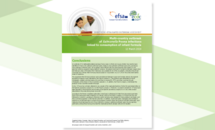Rapid outbreak assessment: Multi-country outbreak of Salmonella Poona infections linked to consumption of infant formula
This document provides an assessment of the cross-border public health risk related to the multi-country outbreak of Salmonella Poona infections in infants and young children linked to consumption of infant formula.
Executive summary
The outbreak of Salmonella Poona cases affecting France (30 cases), Belgium (1) and Luxembourg (1) is linked to infant formula products based on rice proteins. All 32 patients were infants and young children infected with the same bacterial strain with onset of symptoms between August 2018 and February 2019.
The suspected infant formula products based on rice proteins were made by a factory in Spain between August and October 2018 and marketed by a French company. The products were distributed to EU/EFTA and four non-European countries through wholesalers, online shops or e-commerce.
So far all tests performed at the Spanish factory and on samples of the implicated batches have been negative for Salmonella Poona. This may be due to the fact that Salmonella is typically difficult to detect in dried products and requires sampling and testing methods with a high degree of sensitivity.
A recall and a withdrawal of infant formula products and baby food of the same brand were initiated on 24 January 2019 by the French company in France, followed by a recall in Luxembourg. Public warnings released in France, Belgium and Spain should decrease the risk of new infections. However, additional outbreak cases may be reported, among those who bought and consumed the products before the recall.
In order to prevent infections when using infant formula, Member States should consider providing advice to the public on basic hygiene rules for the preparation of food for infants, including information on the safe preparation, handling and storage of powdered infant formula products. Caregivers of children who have consumed infant formula and develop diarrhoea should be advised to contact their healthcare provider.
Cases of salmonellosis in infants should be notified to the national health authorities for serotyping. S. Poona isolates should be sequenced to identify whether they are associated with this outbreak.
ECDC is funding whole genome sequencing (WGS) analysis of human S. Poona isolates from cases possibly related to this outbreak and reported in countries that do not routinely perform WGS.






